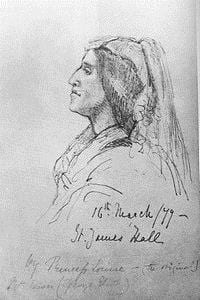In our next research meeting, on Thurs 22nd Oct, we will hear a paper from Phyllis Weliver (St Louis University) on Daniel Deronda. The meeting will begin at 5.15pm in MC0024 (Ground floor, MHT Building, Brayford Pool campus). Refreshments will be served from 5pm.
Please find Phyllis’s abstract and short biography below:
‘musical, I see!’: Daniel Deronda, the Aesthetic Critic and New Liberalism’
This paper explores a vital and thus-far neglected step in understanding the late nineteenth-century development of the Aesthetic Critic (someone whose worth as a critic depended upon displaying his or her response). It presents a new theory of ‘triangulated’ aesthetic criticism: someone contemplates someone else, while both of them respond to an aesthetic object. This is the key to understanding how an art object can become part of the social construct.
Prime Minister Gladstone’s daughter, Mary, assessed musical performances through triangulation. Her response to George Eliot’s Daniel Deronda (a musical novel largely about aesthetic assessment), was arguably a form of aesthetic criticism, too. After each reading of the novel (1876, ’78, ’79), Mary Gladstone became increasingly involved in her father’s political work, eventually becoming a major force in the birth of new liberalism (the welfare state). Her role as the first female prime ministerial private secretary in a sense displayed Mary’s critical response to the novel. The paper also introduces George Eliot into the trajectory of the Aesthetic Critic (more usually seen as Arnold – Pater – Wilde), offers new understandings of how liberalism was practiced and, through a close discussion of Daniel Deronda, proposes fresh interpretative strategies.
Biography
Phyllis Weliver is Associate Professor of English at Saint Louis University. She is the author of the monographs Women Musicians in Victorian Fiction and The Musical Crowd in English Fiction. She has also edited two collections of essays: The Figure of Music in Nineteenth-Century British Poetry and, along with Katharine Ellis, Words and Notes in the Long Nineteenth Century. With the support of a National Endowment for the Humanities Fellowship, Phyllis is currently finishing a monograph on Mary Gladstone and the Victorian Salon, which will be published with Cambridge University Press. Today’s talk is drawn from this book. Phyllis has also begun an academic book with Ewan Jones titled One Music: The Tennysons’ Performance of Family Life, and is leading a digital humanities team in creating a freely available web application called Sounding Tennyson, which will be live this spring. Sounding Tennyson is the case study for a much larger digital Tennyson archive, on which Phyllis is pleased to be collaborating with Jim Cheshire, Sibylle Erle, and Ewan Jones.

Leave a Reply